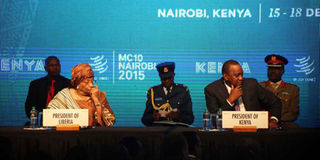Food security lobby sceptical of WTO's ability to solve subsidies issue

President Uhuru Kenyatta (right) and Liberian President Ellen Johnson Sirleaf during the official opening of the World Trade Organisation's tenth ministerial conference at the Kenyatta International Convention Centre on December 15, 2015. PHOTO | DIANA NGILA | NATION MEDIA GROUP
What you need to know:
The lobby took issue with the way US, EU, Canada and Australia blocked an agreement on public stockholding programmes for food security which it said could benefit developing countries.
Public stockholding programmes allow developing countries to provide subsidies for domestic agricultural products as long as they don’t exceed certain levels.
World Trade Organisation’s critics on Monday voiced their fears of the body’s inability to solve longstanding trade issues as it emerged a deal on food security may not be reached.
Nairobi is from Tuesday hosting the tenth ministerial conference of the WTO, also known as MC10, in the backdrop of several stalled negotiations touching on agricultural subsidies, sensitive technology and barriers to free movement of goods across borders.
In a press statement, an alliance of lobby groups group calling itself Peoples Coalition on Food Sovereignty (PCFS) argued developing countries should stop expecting solutions from the WTO because rich countries are using the organisation for self-interest.
“Achieving a genuine food security deal will not be possible within the WTO. You can’t expect solutions from a system that breeds the world’s problems. The only ‘permanent solution’ in sight is to junk the WTO!” the activists said in a statement on Monday.
AGRICULTURAL SUBSIDIES
Although MC10 is expected to tackle the issue of agricultural subsidies rich countries extend to their farmers, activists argued there is no certainty the problem will be solved after 15 years of stalling.
The lobby took issue with the way US, EU, Canada and Australia blocked an agreement on public stockholding programmes for food security which it said could benefit developing countries.
These programmes allow developing countries to provide subsidies for domestic agricultural products as long as they don’t exceed certain levels.
During the last WTO meeting in Indonesia in 2013, poor nations were temporarily allowed to subsidise their farmers even if they would exceed the limits of “trade-distorting” actions. These actions would include purchasing from farmers produce at fixed prices by governments.
But this provision expires in 2017, meaning the Nairobi meeting is under more pressure to create a permanent solution.
Developing countries like Kenya previously argued for this agreement so that they can subsidise local farmers and control pricing without being legally challenged by the developed world for distorting the food markets.
“What is cruel here is that developed countries pour billions of dollars to subsidise their products while legally prohibiting poor nations from supporting their own domestic markets as in the case of Africa,” said Prof Edward Oyugi from Southern and Eastern African Trade, information and Negotiations Institute (SEATINI) , an organisation involved in campaigning for better policy in global trading system is part of the food security lobby group.
PARALLEL FORUM
On Monday, several activists and NGOs announced they will hold a parallel forum at the Professional Centre in Nairobi before marching towards the MC10 venue at the Kenyatta International Convention Centre to voice their opposition to the WTO.
On Wednesday, other street demonstrations are expected.
“The Social Movement Working Group against WTO wants the Kenyan Government to withdraw completely from WTO so as to protect local peasant farmers and consumers,” said Cidi Otieno, one of the leaders of another grouping that brings together Kenyan and international activists.
“The meeting will not address the skewed nature of the WTO agreements as they will only serve to facilitate the multinationals to continue dominating the fragile Kenyan market at the expense of local entrepreneurs,” he added.
The Movement includes World March of Women Kenya, Coalition for Constitution Implementation, La Vie Campesina, Food Sovereignty Network USA, TNI, Indignado and Focus on Global South and the Korea People's League announced they will hold street demonstrations on Wednesday to voice their opposition to the trade meeting.




